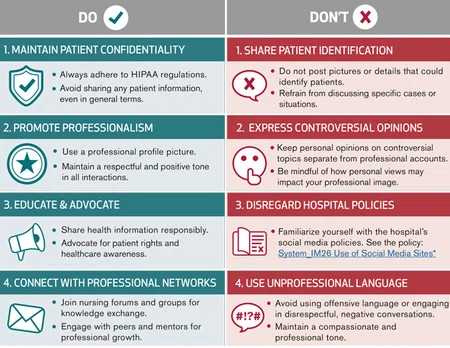© 2024. Houston Methodist, Houston, TX. All rights reserved.


In this
issue

WELCOME
NURSING SCIENCE

Prioritizing Nurse Perspectives in Technology Design

Brand Image of the Nursing Profession

Meet Houston Methodist’s Newest Nurse Scientists!
EDUCATION
PRACTICE

Unlocking Excellence: Practicing at the Top of Your License

Compassionate Care: Supporting and Caring for Nurses
PROFESSIONAL DEVELOPMENT
MAGNET
FROM OUR TEAMS

ABOUT DISCOVERN
PRACTICE
Compassionate Care: Supporting and Caring for Nurses
By Pinky Shani, PhD, MSN, RN, Nicole Bender, MSN, RN, CNOR, Laura Espinosa, PhD, RN, ACNS-BC, NE-BC, Maria Vidal-Michel, MS, CHES, CWC, and Gail Pinsonat, MS, NASM-CPT, CES
By Pinky Shani, PhD, MSN, RN, Nicole Bender, MSN, RN, CNOR, Laura Espinosa, PhD, RN, ACNS-BC, NE-BC, Maria Vidal-Michel, MS, CHES, CWC, and Gail Pinsonat, MS, NASM-CPT, CES

Nursing is valued as the most trusted profession. Over the years, the nursing role has evolved to include direct patient care, care coordination, follow-up, nursing technology and research.1 Nurses are taking on more responsibilities and leadership in patient care, with a significant increase since the COVID-19 pandemic. With the increasing demands on nurses, nurse burnout remains an ongoing concern in healthcare. According to the American Nurses Association, 62% of nurses experience burnout.2 Burnout is associated with emotional exhaustion, physical exhaustion, decreased job satisfaction, and a higher likelihood of nurses leaving their positions. It can also lead to reduced concentration and reduced quality of nursing care. Addressing burnout is imperative to maintain a resilient and effective healthcare workforce. Hospitals continue to prioritize the well-being of nurses and, in turn, improve patient care and satisfaction.
Employee Wellness Services aims to provide a comprehensive, integrative wellness solution for Houston Methodist Hospital, achieving positive, measurable outcomes in health and wellness, productivity, and quality of life to maximize the potential of our greatest asset—our employees. Why should the focus be on wellness? According to the Centers for Disease Control, chronic diseases account for about 75% of healthcare expenditures or approximately $5,300 per person annually.3 Chronic disease, presenteeism, and absenteeism are the foundations for why worksite wellness emerged in the 1990s.
According to Maria Vidal-Michel, Manager of Employee Wellness Services, Employee Wellness provides tools to help employees and their families become more resilient and hopefully decrease stress and burnout. For some, this could be cooking a healthy meal with loved ones, getting a massage, meeting co-workers for a fitness class, or just going for a walk. In 2023, Houston Methodist relaunched Healthy Directions as Healthy Directions+ to incorporate more services and benefits to address the whole person’s needs. This change includes, but is not limited to, mental and emotional, financial, spiritual and intellectual wellness.
Maintaining nurses’ well-being is more than the personal responsibility of the individuals; it is the collaborative effort of systems, organizations, and leaders supporting them. At Houston Methodist West Hospital, Laura Espinosa, Chief Nursing Officer, and Pinky Shani, Nurse Scientist, collaborated with Reining Strength Therapeutic Horsemanship in Richmond, Texas, for the project “Therapeutic Horsemanship for the Caregiver (PRO00034749)”. This research study explored the effect of Equine-Assisted Service (EAS) on stress, job burnout, anxiety, and resiliency among healthcare providers pre-intervention, post-intervention and at one-month follow-up. The intervention lasted four hours and included i) Painting the Horses: participants were asked to paint something on the horse that represents strength in themselves; and ii) Life’s Little Obstacles: participants wrote on post-it notes things that represent challenges faced and placed them on an obstacle in the arena. As a team, participants worked to get the horse over the obstacle. Results showed a significant decrease in stress, job burnout, and anxiety and a considerable increase in resiliency from pre-intervention to post-intervention. Furthermore, qualitative data suggested an improvement in awareness of underlying distress:
“I was still angry, and the trauma was still pretty fresh when we were having small group discussions. It didn’t make me feel alone in my struggles.”
“I was able to talk more about my feelings without the anger and guilt that I had experienced.”
“Having worked through the pandemic is not something for me that I can get over and move on from.”
“And the burnout I feel at times won’t fully go away any time soon, but I feel that I can handle it better now.”
Since its initiation in 2022, “Therapeutic Horsemanship for the Caregiver” is now being offered to Sexual Assault Nurse Examiners. It is under consideration for implementation among additional entities of Houston Methodist.
Positive and supportive workplace environments and organizational policies and procedures impact nurses’ well-being.4 At Houston Methodist The Woodlands, Wellness Coordinator Gail Pinsonat, and Patient Experience Specialist Jenny Peuplie collaborated to provide an innovative approach to offering accessible and convenient wellness support and resources to nurses.
Each month, Pinsonat and Peuplie coordinate with the department’s leadership to establish a schedule for the day and night shift nurses to have the opportunity to take a short break from patient care in the middle of their shift to learn compassion skills and strategies to improve their perceived stress without having to leave the unit. The wellness initiative, “Compassionology,” travels to the nursing units multiple times each month to provide short in-services and wellness classes. Peuplie supports a small group of nurses as they describe and identify their emotions to lower stress while reducing displacement of feelings directed toward other areas or persons within their lives. The nurses learn strategies to demonstrate compassion, such as being present, active listening and validation. At the end of the discussion, the nurses participate in a light yoga and mindfulness stretching session led by Pinsonat.
Their innovative approach to maintaining a commitment to staff and patient wellness has allowed Pinsonat to connect with more nurses to provide support. In 2022, Houston Methodist The Woodlands Wellness Center recorded 2,496 encounters, 1,921 being in person and 575 virtually. In 2023, the Wellness Center surpassed their encounters in 2022 to end the year with 5,654 encounters, 3,854 in person and 1,610 virtually. The following services showed the most significant increase in utilization by employees:
- Annual fitness class participation increased from 47 encounters in 2022 to 1,171 encounters in 2023.
- 15-minute wellness sessions at huddles increased from 32 encounters in 2022 to 452 encounters in 2023.
- Biometric screenings increased from 27 encounters in 2022 to 75 encounters in 2023.
- Virtual seminar participation increased from 356 encounters in 2022 to 1385 encounters in 2023.
Ensuring nurses have access and availability to utilize wellness resources and services is vital for the growth of the Employee Wellness Center and the sustainability of healthier work environments.
The increasing demand for nurses, exacerbated by the COVID‐19 pandemic, highlights the need to ensure organizations establish a robust and resilient workforce.5 The Houston Methodist System wellness services and innovative ongoing nursing research support nurses in maintaining resiliency despite the adverse circumstances of the workforce. The nurses’ ability to cope successfully and appropriately with the stresses of the job and day-to-day lives impacts their ability to remain engaged in the organization and patient care.
Contact your entity-specific Employee Wellness Center for more information on prioritizing your well-being and what resources are available to you.
Reference:
- Maryville University. Evolution and History of Nursing Profession. Published September 4, 2023. Accessed January 22, 2024
- American Nurses Association. What is Burnout? How to Prevent It? Accessed January 22, 2024 Nurse Burnout: What Is It & How to Prevent It | ANA (nursingworld.org)
- Raghupathi, W., & Raghupathi, V. (2018). An Empirical Study of Chronic Diseases in the United States: A Visual Analytics Approach.
- Schultz, P. N., Remick-Barlow, G. A., & Robbins, L. (2007). Equine-assisted psychotherapy: a mental health promotion/intervention modality for children who have experienced intra-family violence. Health & social care in the community, 15(3), 265–271. https://doi.org/10.1111/j.1365-2524.2006.00684.x
- National Academies of Sciences, Engineering, and Medicine; National Academy of Medicine; Committee on the Future of Nursing 2020–2030, Flaubert, J. L., Le Menestrel, S., Williams, D. R., & Wakefield, M. K. (Eds.). (2021). The Future of Nursing 2020-2030: Charting a Path to Achieve Health Equity. National Academies Press (US).









